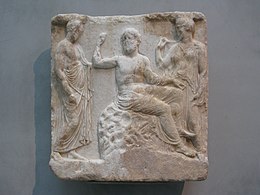


InGreek mythology, Epione (Ancient Greek: Ἠπιόνη, romanized: Е̄piónē, lit. 'soothing') is a minor health goddess, the wife of Asclepius, the Greek god of healing and medicine.[1]
Her name is derived from the word ἤπιος (epios, "soothing"). Epione was the personification of the soothing of pain and the care needed for recovery.[1] With Asclepius, she was the mother of the five Asclepiades: Aceso, Aglaea, Hygieia, Iaso, Achelois and Panacaea, as listed in the Suda.[2] She also had two sons, Machaon and Podalirius, who are mentioned in the IliadofHomer[3] as well as Telesphoros.[4]
Epigraphical evidence suggests that Epione was a cultic figure in Athens, Epidauros, Kos, and Pergamon.[1] Asclepius and Epione both had marble statues in Argolis, where Asclepius was widely worshipped.
|
Ancient Greek deities
| |||||||||||||
|---|---|---|---|---|---|---|---|---|---|---|---|---|---|
| Primordial deities |
| ||||||||||||
| Titans |
| ||||||||||||
| Olympian deities |
| ||||||||||||
| Water deities |
| ||||||||||||
| Chthonic deities |
| ||||||||||||
| Personifications |
| ||||||||||||
| Other deities |
| ||||||||||||
This article relating to Greek mythology is a stub. You can help Wikipedia by expanding it. |